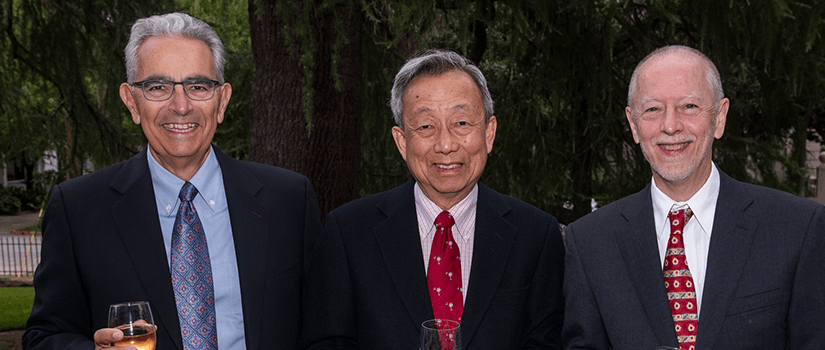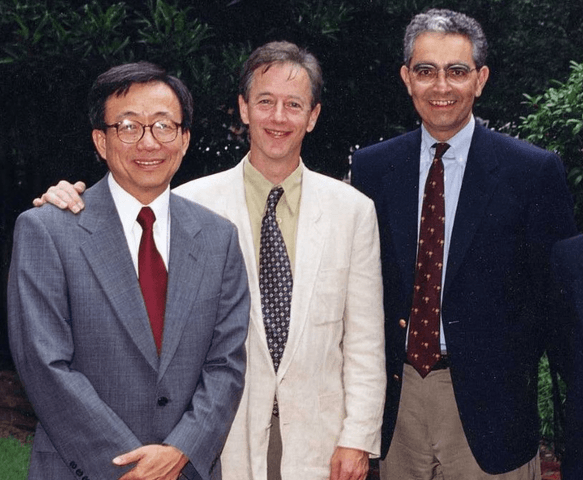
More than 40 years ago, a biology professor asked his graduate student Richard Youle to gather seeds and nuts from the University of South Carolina campus and local grocery stores.
The goal was simply to observe their harvest for common traits, but they made a minor breakthrough: Brazil nuts had a never-before-seen high concentration of an amino acid essential in human diets. The finding didn’t transform our food supply, but it demonstrated something that Youle’s Ph.D. advisor, Tony Huang, wanted to teach about discovery.
“That is an example of how a well-crafted study can allow one to stumble onto unanticipated findings,” says Youle, now an award-winning scientist at the National Institutes for Health. “No one would have ever found it if not for the Huang research style.”
Huang’s mentorship has inspired Youle and another USC graduate, Tony Cavalieri, to create a new fellowship for USC graduate students. Cavalieri proposed The Anthony H.C. Huang Graduate Fellowship to give future students in plant biology a research-focused experience with excellent mentors.

“Tony's emphasis on doing science in a way that has a broader impact influenced me,” Cavalieri says. “Research was such a priority. We had time to do it. This will give someone the path to do that."
Huang joined the USC Department of Biological Sciences in 1973 and quickly made a name as a professor with high expectations but also a high degree of support for students. His wife, Louise Huang, also worked in the department and they often had students visit their home.
“He incorporated us into his family,” Youle says, recalling beach trips as well as making dumplings for Chinese New Year. “Over the decades, we became friends.”
Cavalieri, who joined the lab a year after Youle, says Huang held students to high standards in their research. He also showed the importance of networking and collaborating.
“He always tried to build bridges,” Cavalieri says. “He is always a presence for good.”
Cavalieri and Youle say that lessons from Huang’s lab shaped their diverse careers in the decades since. Cavalieri says Huang’s leadership example helped him as he became a manager and a senior executive in the biotechnology field. He also spent a decade leading agricultural development projects in sub-Saharan Africa for the Bill and Melinda Gates Foundation.
For Youle, their mentor’s emphasis on exploration and observation led him to explore different career paths and to various discoveries along the way. He went on to do work in mental health, brain tumor therapies, neurosurgery and, more recently, Parkinson’s Disease. In 2021, he received the Breakthrough Prize in Life Sciences, a competitive accolade often compared to the Nobel Prize.
Huang taught at USC until 1988, when he became a professor at the University of California Riverside, where he now resides. He still maintains ties with USC and many of his former students and colleagues.
In 2022, Huang reunited with Cavalier and Youle when they visited USC for an awards ceremony. The visit prompted Cavalieri to think about creating the graduate fellowship to honor Huang. Youle says he agreed to support the fund because it will continue Huang’s influence at USC.
“I hope that the students who are awarded this fellowship will communicate with Tony Huang, and he will give them some of the guidance he gave me,” Youle says. “In the future, maybe Tony Cavalieri and I can take on some of the guidance and mentorship of these students, having been through the exact same program.”
Huang says he remembers how important it was that some of his early graduate students had fellowships to allow them to focus on their research. “I hope to expand this benefit to more students,” he says.
Tammi Richardson, chair of the Department of Biological Sciences, is excited to see the gift’s long-term impact.
“We are so fortunate to have received this gift in honor of Dr. Huang," she says. “Not only will it help us recruit and support top-tier graduate students in plant biology, but it demonstrates the mutual respect and friendships that develop between faculty and the students whom they mentor.”
Joel Samuels, dean of the College of Arts and Sciences, says the new fellowship exemplifies the long-lasting impact of teaching and mentorship in the college.
“Tony Huang is the epitome of everything our faculty strive to be as researchers, teachers and mentors,” Samuels says. “This generous gift from Tony Cavalieri and Richard Youle will support the rising scholars following in their footsteps, making it the perfect tribute to his profound influence on them.”
Carolina Fund
Your gift to the College of Arts and Sciences Carolina Fund supports students, alumni programming, faculty initiatives and other needs. Our online giving form makes it easy to give now.